

PopEntertainment.com >
Feature
Interviews - Actors > Feature Interviews -
Actresses >
Feature Interviews A to E >
Feature
Interviews P to T >
Albert Brooks and Sheetal Sheth
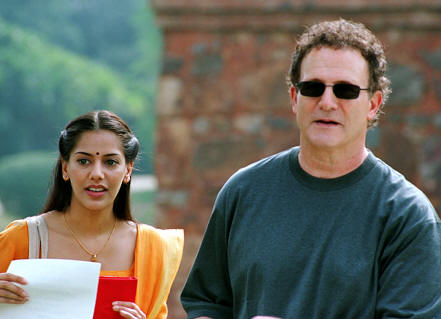 Albert
Brooks and Sheetal Sheth
Albert
Brooks and Sheetal Sheth
Looking for Symmetry with the Muslim World
by
Jay S. Jacobs
Copyright ©2006 PopEntertainment.com. All rights reserved.
Posted:
January
20, 2006.
Albert Brooks is no
stranger to controversy. He has done comic films mocking love (Modern
Romance), death (Defending Your Life), consumerism (Lost in
America), family
(Mother), artistry (The Muse) and the voyeuristic tendencies
of the American people (Real Life).
Still, the respected
filmmaker is a little taken aback by the reaction to his latest film, a
comedy about understanding cultures called Looking for Comedy in the
Muslim World. In the film, Brooks plays an obtuse, whiny comedian also
named Albert Brooks, who is approached by the US Government (in the guise of
former-Senator and actor Fred Dalton Thompson of Law & Order, also playing a
fictionalized version of himself) to take part in a top-secret study.
Brooks is asked to go to India and Pakistan to foster cultural understanding
by trying to find out exactly what it is which makes the Muslim people
laugh.
Brooks chose as his female
lead New York-born Indian actress Sheetal Sheth, who had grown up in the
United States but visited family in India regularly through the years. The
film is a big break for Sheth, who has made respected indie films
such as
ABCD, Wings of Hope, A Pocketful of Dreams and Dancing In Twilight.
She has also appeared in the series The
Agency and Line of
Fire and TV movies like The Princess and the Marine.
Sony, the first studio set
to release the film got skittish because of the supposedly inflammatory word
in the title. The film was snapped up by Warner Independent Pictures, which
is now releasing it to theaters.
Brooks and Sheth sat down
with us at Drake Hotel in Manhattan
to discuss the movie.
What drove you to make this film?
Albert Brooks: (For) the very reason that I'm able to sit here and have this
discussion with you. After September 11th, I sat
in my house for a year and was scared. All that was happening was in the
first year was that the next one was coming tomorrow. Maybe this weekend.
Maybe on Monday. You saw what happened. I had this little movie that I
was in
–
My First Mister
– that opened in the theater in Rockefeller Center
the day after the Anthrax scare. Oh, that's going to be great. That's what
you want to get a good house. Tell them that there's anthrax in the
theater. That entire year was everybody was panicked. The second year the
attacks were going to come on the holidays. Be careful on July
4th!
I wouldn't go to Time Square on New Year's Eve. I would be careful.
The third year – it's going to come… we’re not sure it's going to come. But
what they kept telling us is that this is never going to go away. Right?
That's what they say to us. Don't get used to this being like other wars.
Other wars have conclusions. This will be around for as long as you will.
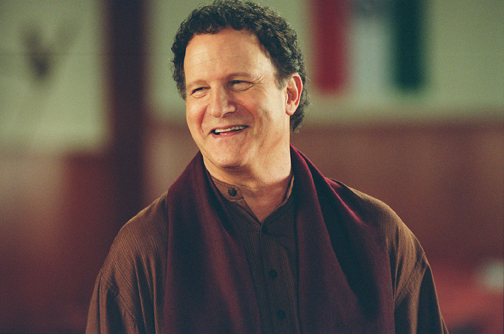 One
day I thought; this is insane. So what is our life like? Are we going to
hide until we're killed? You want to get back to a normalcy even if there
is some impending doom. And normalcy is, in my mind, to be able to deal
with it in a motion picture comedy. That's what normalcy is. There have
been no comedies. Certainly not from America. It's interesting if you look
at all the pictures that have risen to the top at the end of 2005 virtually
all of them are set in the past. It’s like that’s how people are (dealing
with things.) Every movie from
Munich
to Brokeback Mountain and Good Night and Good Luck and
Memoirs of a Geisha and Squid and the Whale – these are all
movies from the '70's, '60's and '80's. One way to deal with it is to not
even talk about a world after 2001. Then the comedies that have been made
that (do) deal in the supposed present are generally these teenage sex
comedies anyway that never talk about the world. They talk about getting
laid. So they’re not going to deal with it. So what do you do? I just
thought I just want to find a way to just get in this door. Just to be able
to stand up and say, I’m acknowledging the new world here. Maybe we can get
a few laughs for 98 minutes and then we'll go on. By the way, if ten years
from now, which according to them we're still going to be in this, if there
are a hundred comedies it'll be a better place.
One
day I thought; this is insane. So what is our life like? Are we going to
hide until we're killed? You want to get back to a normalcy even if there
is some impending doom. And normalcy is, in my mind, to be able to deal
with it in a motion picture comedy. That's what normalcy is. There have
been no comedies. Certainly not from America. It's interesting if you look
at all the pictures that have risen to the top at the end of 2005 virtually
all of them are set in the past. It’s like that’s how people are (dealing
with things.) Every movie from
Munich
to Brokeback Mountain and Good Night and Good Luck and
Memoirs of a Geisha and Squid and the Whale – these are all
movies from the '70's, '60's and '80's. One way to deal with it is to not
even talk about a world after 2001. Then the comedies that have been made
that (do) deal in the supposed present are generally these teenage sex
comedies anyway that never talk about the world. They talk about getting
laid. So they’re not going to deal with it. So what do you do? I just
thought I just want to find a way to just get in this door. Just to be able
to stand up and say, I’m acknowledging the new world here. Maybe we can get
a few laughs for 98 minutes and then we'll go on. By the way, if ten years
from now, which according to them we're still going to be in this, if there
are a hundred comedies it'll be a better place.
Sheetal Sheth: I’d heard that the movie was being done and the people involved in
getting the movie together had told him about different actors. And we just
met. It was before the actual physical casting. It was more him kind of
picking my brain about India
and about the culture and about women there. I was like, (sighs and
speaks low) uh-oh, don’t do it about India.
I was all nervous and protective. Then I met him and honestly was so struck
about how specific he was about staying authentic and real. He asked me so
many questions that were so specific. It was so nice, and I was, how do I
be a part of this? Because he’s going to do it with the respect and dignity
that it needs to be done with. Then I was like, okay… whew. (laughs)
Can you talk about what happened with the distribution of this film?
When did you know that Sony was getting cold feet? How did you end up at
Warner Independent Pictures?
Albert Brooks: They wasted five months of our lives, actually. The film was made and
financed by (producer) Steve Bing. He had a deal with Sony. They knew
about the movie, obviously, and they were excited about it. They picked
Tri-Star as the division they thought could best handle this. Then after the
movie was finished I went over there and I had one scene – that Fred
Thompson scene edited – and I showed them that and I told them the rest of
the story and the title. Everyone felt excited after that meeting. I
didn't feel as excited as the others because when I told them the title then
one of the big shots in the meeting sort of made a joke that was weird to
me, like, “Oh, good title. I guess we’re going to have to put in extra phone
lines in to take these calls, huh?” When studios say things like that
there's never anything good about it. If a studio sees a rough cut and
says, “Yeah, that scene was a little long,” that scene is never going to get
into the movie. That’s the way that they let you know something.
So I said in the parking
lot to Steve, I'm worried about that comment. “Don't worry. This is great.”
Okay. So they proceeded and they made posters. They made a trailer. They
had booked us in, you know, they said that we were going to go to the
Toronto film festival and I saw the big release date which was October
seventh. And then, about eight days after that Newsweek story came
out about the Koran being abused in Guantanamo Bay,
I got a call on Monday morning from Steve. He said, “Bad news. So they
don't want to do the title.” Okay. Didn't I say this five months ago? “No.
No. You were right.” You know, one of those things that's supposed to make
you feel better. Gee, I was right. Now my life is over.
So what do they want to
do? “Everything will move along smoothly and they'll call it Looking for
Comedy, if that's okay with you.” No. That's not okay with me.
There's nothing there to that. We can't do it. So I had a conversation
with the head of the movie company and he told me that he just felt that
times had changed and I said, what do you mean? Times changed after 9/11.
They’re not going to change any different. Abu Ghraib was worse than this
and that was a year ago. It's always changing and that's why we're making
the movie. He just said that he was concerned about it. Then quite frankly
I wound up seeing one of the trailers that they made, because I said to him
on the phone, Lets say that I change the title are you going to tell the
audience what the movie is about or are you going to hide it? “No. No.
That's not a problem.” I saw one of these trailers that they made. It was
like Bill and Ted Go to India.
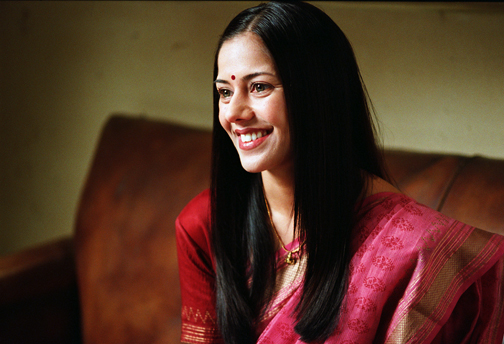 There
was no idea about what the movie is about. A comedian is on his way to
be funny. On his way where? Where are we going?
There
was no idea about what the movie is about. A comedian is on his way to
be funny. On his way where? Where are we going?
Sheetal
Sheth: I knew
what the title is. What’s the big deal? Honestly, I remember I went in to
do some work and Albert is in the middle of all that nonsense. I was like I
don’t get it. I still don’t get it. I don’t think like that, so I guess I
can’t understand it. Even when people explain it to me – I didn’t realize
that we were so far gone to not be able to say Muslim anymore – let alone in
the title of a movie. The thing that is funny to me is that Albert actually
specifically said because there is all that kind of negatory influence
around that word – what can I do to lighten that? What’s the least
offensive, most placid word I could put next to it? That’s comedy. You put
those two words together and hopefully that allows you to kind of lend
yourself to the idea. I just don’t understand what could possibly be
controversial. I think if you see the movie, if anything, it puts everybody
in such a nice light and it’s so intelligent and with some heart on that
side of the world. If anything, it makes fun of Americans, I think.
(laughs)
Albert Brooks: My feeling is, and I don't have any proof of this, but as much as I
understand how very big companies work there are many, many people in a
company that big that aren't really involved in the day-to-day movie
business. The Sony Corporation is in a tremendous amount of businesses and
the movies that they make to some people are meaningless, until one
afternoon when they have nothing to do and they're like, “Let’s see what's
coming up. What is this? Sarah, what's that word?” “Muslim.” “You
sure? Get Charlie on the phone.” So I just think that someone said, “What?
Are you crazy? Get rid of that.” Especially, you know, I'm not someone who
guarantees… (an audience.) I'm not Peter Jackson. They're not going to
have a long, “Well, are we going to have to take some flack, but will we
make half a billion dollars? We'll take the half billion dollars.” I just
think that I couldn't win that argument.
I was upset because
October was now gone. Toronto was gone, but on the positive side I never
would've gone to Dubai
(the film premiered at the
Dubai Film
Festival)
because that would've been too late for that. So that turned out to be like
the coolest thing that ever happened. It's one of those experiences where
you're certain where one thing is going to happen, but something else
happens entirely. So that I sort of think that I'll remember that long after
anything else about this whole movie because it was so wild and unusual.
But you had to know that there was going to be trouble from the start,
right?
Albert Brooks: Yeah. I did know and we could've had (it out at) that February
meeting. What normally happens in the studio is that you go back to your
house and there's a call that says, “Look, they love you. This isn't going
to work out.” No one had the guts to say that then. Then that leaves us a
whole summer to go to Warner Independent and let Warner Independent have
some preparation, instead of in July. Now you’re juggling balls. When do I
come out? I’m coming out January 20th because literally that was the only
day. They're a small studio. They had Good Night and Good Luck.
They had
Paradise (Now).
They don't have a lot of employees. It's not like landing patterns at JFK.
You can't get in. You have to go back to Ohio and start.
So what does make Muslim people laugh?
Albert Brooks: I'll tell you what's funny. As the crew sort of warmed up to me; the
Hindus, the butt of their jokes are the Sikhs. They’ve got Sikh jokes. I
mean, there was one joke that I didn't understand that wasn't like, “How
many Sikhs?” But it was like, “Two Sikhs played a chess game, yes? They
simply did not play.” (laughs) I mean, it was like – what? Okay.
I get it. I understand. Then we had a Sikh driver who was telling me the
Muslim jokes. “Did you hear about the Muslim?” I get it now. I saw the
hierarchy. So it seems to me that everywhere on the planet somebody is
talking about someone else. As I say in the movie, Polish jokes work
everywhere.
Sheetal Sheth:
Like I said, at first I felt very protective and then I spoke to Albert. It
was just so beautiful, and so simply creative and smart. Always a movie I
feel like with great ideas. So I just… I was like, I don’t know, what does
make everybody laugh? (she laughs) I don’t even know what makes
Americans laugh.
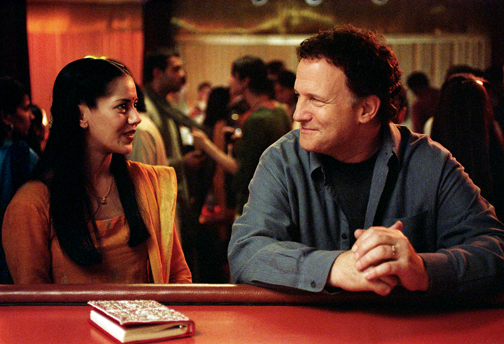 Albert
Brooks: The
purpose of the movie was always… this was similar to other movies that I've
made, which were Real Life and Lost in America. One of the
themes I've always liked was the ability to take on these highfalutin’
dramatic projects and I have no clue how to do it. At one point and I'm not
saying that this couldn't even be done as another vehicle on television – if
you were going to… this could be an interesting twelve-part HBO show where
you really do go to different countries and then it becomes a pure
documentary. But the idea of my character having the inability to find this
out and the truth is that it's not very easy to find out anywhere. I've
been doing comedy in this country my whole life and I can't tell you much
about what makes people laugh here. So this idea about finding out what
makes people laugh is pretty hard to do even if you were going to do it
seriously. But it was never the plot of the movie.
Albert
Brooks: The
purpose of the movie was always… this was similar to other movies that I've
made, which were Real Life and Lost in America. One of the
themes I've always liked was the ability to take on these highfalutin’
dramatic projects and I have no clue how to do it. At one point and I'm not
saying that this couldn't even be done as another vehicle on television – if
you were going to… this could be an interesting twelve-part HBO show where
you really do go to different countries and then it becomes a pure
documentary. But the idea of my character having the inability to find this
out and the truth is that it's not very easy to find out anywhere. I've
been doing comedy in this country my whole life and I can't tell you much
about what makes people laugh here. So this idea about finding out what
makes people laugh is pretty hard to do even if you were going to do it
seriously. But it was never the plot of the movie.
Sheetal Sheth:
Here’s the thing, right? I think it’s funny. It’s not a documentary. It’s
a comedy. It’s really about – we’re all people. We all laugh at different
things. I couldn’t tell you what you guys are going to laugh at as much as
I could tell anybody from India and Pakistan or anybody in the world. We
all laugh at different things. We’re moved by different things. My family
laughs at things that I think are ridiculous. (laughs)
What about jokes about the Palestinians?
Albert Brooks:
Well, I heard a Palestinian joke yesterday, somebody told me... I'm trying
to think if remember. The big sacrilegious thing is for a person like me to
tell a joke badly. These two Jewish men travel the subway everyday for
years and years and read the Jewish press every morning. Then one morning
one of them is reading an Arabic newspaper and the other one says, “What's a
matter with you? What's happened to you? Why are you reading that paper?
Have you lost your mind?” He said, “No. To tell you the truth all I read
in the Jewish paper is that Israel
has been blown up and that the Jews aren't allowed to enter and that life is
terrible. In this paper it says we own all the banks. We own the media.
Life is much better in this paper.”
Woody Allen said earlier this year that he’d do standup again, but it’s
easier for him to make movies. What about you? Would you consider going
back to do standup?
Albert Brooks:
Well, let me address why it's easier for him, and I admire that he can make
so many movies. But Woody Allen is the only person, the only person who
somehow – and I think that he started that way and he's still able to do it
– he doesn't do the publicity. He doesn't do any of this stuff that all of
us have to do to sell. So he finishes, goes back to his house and starts to
write again. That's a great luxury just to never get into the business part
of the business of making movies. I've had to raise the money. I've also
had to do as much as I'm able to do this part. I enjoy this part more than
he does. Especially with this movie, the discussions are interesting. It
feels more political just to talk about the world. But that's all he ever
did. He never previews. He never does anything. He just makes one movie
after another and that's an amazing luxury. I've thought about doing
standup. I don't know how serious I am about it. I see some of the new
places in Las Vegas.
Those rooms are so beautiful and they pay well, God knows. I don't know.
It would have to be a different mindset.
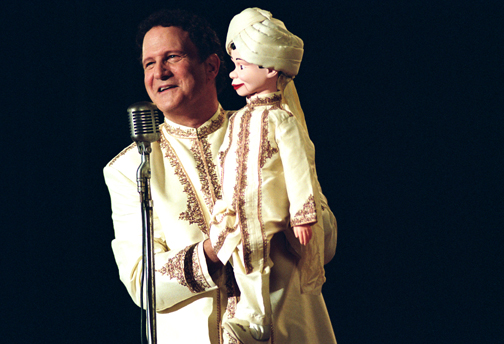 Did
you try to recreate your act in the film?
Did
you try to recreate your act in the film?
Albert Brooks: Oh, God no. My act is better than that. By the way, that improv bit
is a really cool comic thing. But I wrote that for the movie. I never
really did that bit onstage. Danny and Dave I used to do all the time. The
jokes, you know as I say to them, “I’m going to try stuff at the bottom of
the barrel and intellectual stuff.” So I have more bottom of the barrel. I
don’t know what I would do if I were really, really just going to do standup
in India. I don't
know what I would do. Now I think that I've scared myself out of ever doing
it.
When you did that, where you just doing standup as they sat there and
watched you silently?
Albert Brooks:
Remember I'm the director and we have to get those people. That was filmed
over two days because you have to shoot from sixty different angles and so
in the beginning of the first day – first of all, I'm talking to them as the
director and welcoming them. Their inclination because they want to and
they have a lot of energy is that they were laughing at everything. Then
you have to tell them not to laugh and so then you go through a period where
once you tell people not to laugh two people do, and everyone laughs at
them. But fortunately you put in the heat and you put in five hours without
a break and no one is laughing anymore. As a matter of fact you get a few
people going, (yells) “When do we get to eat?!” I'm like, that you
can't say either. Don't yell at me. Just be quiet.
How was it to watch Albert do stand-up? We’re probably not going to ever
get to see that…
Sheetal Sheth:
From one of my meetings with him, he literally acted out the movie.
Because, he doesn’t let anyone read the script and I begged him after the
fact. I begged him to please let me read it before we do it. So he acted
out the whole movie for me. It was like a two-hour seeing Albert do his
thing. It was just such a high. (laughs) I was there just
listening and watching and kind of taking it all in. Working with him, he
obviously has a script and he really is very strict about staying to it, but
then he likes to work to the moment. So he’s just constantly improvising
and just seeing him go... We were just all – me and the two Johns
(John Carroll Lynch and Jon Tenney, who play the two government agents
assigned to Brooks) were just in awe of him. We were like, wow,
we get to see Albert Brooks do this every day.
So
he didn’t show you the script first?
Sheetal Sheth:
No. Even when I was auditioning, I didn’t realize until after that the
sides that we were using weren’t from the script. He just kind of wrote
something somewhat related. Then, on my very last meeting with him, before
he asked about the movie, I signed a bunch of confidentiality agreements.
Then he did that and then kind of, for the first time, cold read scenes
together. Then he told me I got the part. When we were talking for the
month before we went to India,
I said (begging) “Albert, can’t I please read the script?”
(laughs) He’s like, “No, don’t worry. It’s fine. You’ll be fine.”
Then he finally let a few of us, we went to his office alone when he was
there and we read it and we gave it back to him and that was the last time I
ever saw the script.
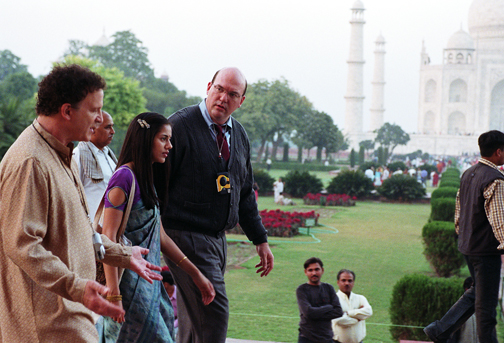 Did
the Indian authorities know what the premise of the movie was about?
Did
the Indian authorities know what the premise of the movie was about?
Albert Brooks: Oh, everything. They knew everything.
Did you send them a script?
Albert Brooks:
I was able to… because at the time I was still writing. When I went there
initially I told every beat of the movie, and then I sent a forty five page
description of every scene. And they had minders that sometimes they didn't
come to the set, but they had that right to listen. I wasn't trying… you
know, in my heart I wasn't pulling a fast one. So I wasn't worried. I was
really worried in my first meeting with the Minister of Culture when I went
there, I'm describing the thing, and then of course my character comes
because the government doesn't send me or doesn't even care, and then you
guys don't even know what I'm doing here. Pakistan
certainly doesn't, and it sort of starts a (mumbles) you know, war
between the two… (in Pakistani accent) “I'm sorry. What does it
do?” Oh, you know, it starts a war between the two countries. They didn't
mind that because I started to watch the Bollywood movies – they've been
dealing with Pakistan… this relationship is a lot greater than my… I'm not
the first one who came up with what do you guys do with Pakistan?
They deal with that.
What
they do mind, they had other issues. There were religious issues. As I
said to Letterman which was true, the guy told me that they wouldn't let
Raiders of the Lost Ark shoot there because there was a scene where they
ate monkey brains. (It was actually the second
Indiana Jones movie.) Actually what I told the Minister very respectfully, you know, you
really in the future should take our money and let us do it because now with
CGI they'll make any place look like India and they'll do all the things
that you don't want anyway, and so at least get our money.
At the end, Albert leaves, there is no war and everything is fine
again. Why?
Albert Brooks: Well, it wasn’t fine again. By the way, the opposite of that, they
dropped looking for comedy and they put their money in a bomber that doesn't
have to leave the hangar. So it's not fine again. But it's a very good
question and one of the reasons for that first sentence is actually a
promise that I had made to the Indian Government. I said I will let the
India/Pakistani conflict at least be… it was my fault… and not leave the
movie feeling that you guys were at war.
What about conservative former Senator Fred Dalton
Thompson (who plays a fictionalized version of himself)? What did he think
about it?
Albert Brooks: We had a screen in Washington on Sunday at
the Center for American Progress and he was there and John Kerry came, and
he saw the movie for the first time and he was pleased. Fred Thompson –
that was something that he was hesitant to do because he'd never played his
own name and he worried about it. He was a fan. When I cast Rip Torn in
Defending Your Life, he was the other guy. They both came down to the
wire. I had known Fred and he liked me, but you know his own name, he was
worried. But he said, “Well, I'll trust you.” He actually said, “You're
not going to pull a Michael Moore here are you?” I said, no, Fred. That's
not what I'm doing. This is the movie. Then coincidentally after the movie
was already finished I was sort of pleased that Fred was the guy appointed
to lead John Roberts through the Senate because it raised his political “Q”
(quotient). He was all of a sudden back on Fox News talking about John
Roberts. It was good.
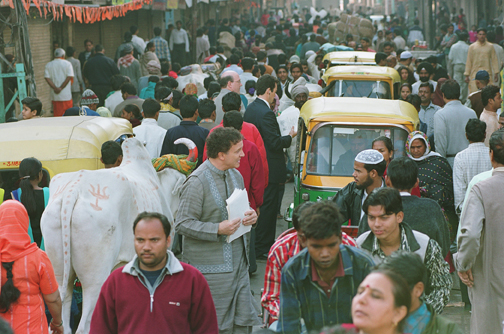 Being familiar with both worlds – The US and India – is
there really that much difference?
Being familiar with both worlds – The US and India – is
there really that much difference?
Sheetal Sheth:
I think I’m as American as anybody else. I think American especially means
a mix of cultures. To me all-American isn’t blonde and blue-eyed. I think
if someone ethnically is kind of questionable, that’s America to me,
actually. India is my home. It’s where my family is. I love it. I love
it as much as I love being here. I’ve spent so much time there. There’s
nothing like the people there. Really, the heart is unbelievable.
How do you think American relations with the Middle East
can be helped?
Albert Brooks: I don't know what the solution is, but what we really need to do is
that we don't have any public relations this country. That was the whole
idea anyway. I call it the Schmooze Corps. We have fifty thousand people
on the ground just to look people in the eye and take them to jail. There's
no interpersonal contact with America and the rest of
the world anymore. The current leadership doesn't choose to do that.
Remember when Kennedy went to Berlin and said one sentence in German and
they loved us for twenty years. There's just no attempt at this and it
blows my mind. It's really upsetting to me.
Indians who aren’t Americanized like you, how do you think they’ll react?
Sheetal Sheth:
I think they’re going to welcome it, I really do. To see people that they
recognize, that look like them, that talk like them. That are saying things
and people are reacting. And seeing how ignorant we all can be when going
to certain places. I think they’re going to laugh and going to love it.
Since India is a predominately Hindu nation, did you try to go to other Muslim
countries first?
Albert Brooks: No. India and
Pakistan was always part of the plot. I had a number of issues to deal
with. One, you need some jeopardy when they give you this assignment and
Americans don't readily go to Pakistan and Pakistan is a Muslim country.
Obviously, as it's explained in the movie in India the Hindus are the
majority of the population, but what makes India interesting is that their
minority population makes it the second largest Muslim population in the
world. It's just so many people.
Sheetal Sheth:
I guess everyone defines a country in different ways. I don’t really know
India as specifically… I’m not sure what that means in terms of when you say
“a Muslim country” or “a Hindu country” or “an American” or “a Catholic.” I
don’t really get that, because I feel we’re a mix of so many different
things. I can understand why people would say that, I mean, considering the
nature of our government and the world it seems to lend itself that way.
(laughs) But obviously, what we stand for – you know, we separate
church and state. And so does India. We’re supposed to. (laughs again)
We’re supposed to where some countries don’t… Albert has already said that
not many Saudi Arabian countries would have allowed them to actually film
there. He tried to call some people.
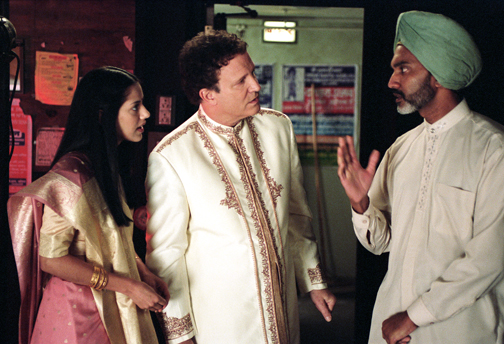 Albert
Brooks: But even if it is my initial desire, I cannot go to any of the
countries in the Middle East that would provide jeopardy for the movie. There is no
Saudi Arabian Film Commission that's welcoming people. When the President
of Iran says that they want to wipe Israel off the map on
Wednesday, Thursday he's not saying, “However, let the Jew filmmaker come in
and we'll give him free access to the sites.” I can’t get into Syria.
So where I would be able to film where like Syriana filmed is not
interesting for this movie, which is like Morocco. You go to Morocco and
that's too touristy. Egypt is full of people from Florida looking at
pyramids. So the countries that everyone is ooh in the Middle East
aren't inviting a person like myself. I don't think that there are any
American films that are readily getting in there. There are news crews
obviously that can shoot in Iraq, but getting a movie made you need the kind
of cooperation that our governments can’t even get when they talk to each
other. I don’t know how unions are then going to speak to each other.
Albert
Brooks: But even if it is my initial desire, I cannot go to any of the
countries in the Middle East that would provide jeopardy for the movie. There is no
Saudi Arabian Film Commission that's welcoming people. When the President
of Iran says that they want to wipe Israel off the map on
Wednesday, Thursday he's not saying, “However, let the Jew filmmaker come in
and we'll give him free access to the sites.” I can’t get into Syria.
So where I would be able to film where like Syriana filmed is not
interesting for this movie, which is like Morocco. You go to Morocco and
that's too touristy. Egypt is full of people from Florida looking at
pyramids. So the countries that everyone is ooh in the Middle East
aren't inviting a person like myself. I don't think that there are any
American films that are readily getting in there. There are news crews
obviously that can shoot in Iraq, but getting a movie made you need the kind
of cooperation that our governments can’t even get when they talk to each
other. I don’t know how unions are then going to speak to each other.
Sheetal Sheth:
There are three things. It’s that, number two there’s a relationship
between India
and Pakistan, which is the point of the movie. Kind of creating this… war.
You need that already present. And there’s a relationship with America with
them. And number three, that’s kind of the point! That’s the point
of the movie, in the sense that the government and the people are so
ignorant to think that’s where they would send him. (laughs) You
know? That’s the joke!
Were you familiar with Albert’s movies before? Did you find them funny?
Sheetal Sheth:
Yes. I was quite a fan. Then, before I shot I was, I should probably
review. I wanted to remember his style. So I ended up renting as many
movies I could find of his again. And I made my friends watch them with
me. (laughs)
Albert Brooks: I was hairier then.
What was your favorite movie of his?
Sheetal Sheth:
I think Defending Your Life.
Not The
In-Laws? (which is ridiculed by director Penny Marshall early in
Looking for Comedy in the Muslim World.)
Sheetal Sheth:
(laughs) That’s not like his. I’m thinking of his that he wrote.
This is a really smart film. Do you think audiences will get it?
Albert Brooks: I'll tell you something. If I really asked myself those questions I'd
never be around. I wouldn't be talking to you today. I would've retired
when I was thirty. My whole life, you have to understand, is dealing with
people. The Dean Martin Golddigger Show (in 1969), one of the guys
who gave me my start, Greg Garrison (the director of the show) allowed me to
do the kind of comedy (that I did). But he felt that it was necessary to
give me a lecture like his child before it all started. He took me in his
office and he said, “I just want to tell you something. You're going to
have a very tough career because you’re here and the audience is here.
If I were you I would adjust for that.” He looked at me to listen for my
answer. And my answer was I don't know what you're talking about. He said,
“I just wanted to check. Go do what you do.” I think if I said you're
right, let me go and rework it – that’s what he was trying to see. One of
the most famous sayings in the history of show business is you'll never go
broke by underestimating… That’s all people do, underestimate the audience.
I can't think like that.
Features
Return to the features page
